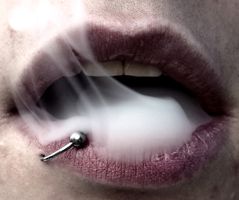Does Smoking Really Turn Your Lips Dark? Myths and Facts
The idea that smoking turns your lips black is a common concern, often mentioned in discussions about the health and cosmetic effects of smoking. But is it true, or is it a myth? This article dives into the science, causes, and misconceptions surrounding lip discoloration and smoking, offering clarity on what really happens and how to address it.

Does Smoking Cause Darker Lips?
Smoking can contribute to lip discoloration, but the claim that it directly "turns your lips black" is an oversimplification. Here’s a closer look at the connection:
Hyperpigmentation
: Smoking, particularly of tobacco products like cigarettes, cigars, or pipes, exposes the lips to chemicals like nicotine and tar. These substances can cause
melanin overproduction
in the skin of the lips, leading to hyperpigmentation. Over time, this may result in darker lips, often appearing brown, gray, or blackish in some cases.
Heat and Irritation
: The heat from smoking and repetitive contact with cigarette tips can irritate and burn the delicate skin of the lips, contributing to darkening or uneven pigmentation.
Reduced Oxygenation
: Smoking reduces blood flow and oxygen to the skin, including the lips, which can make them appear dull or discolored over time.
Staining
: Tar and other chemicals in tobacco can leave temporary stains on the lips, especially in heavy smokers, creating a darker appearance that may wash off with proper care.
However, the extent of discoloration varies widely based on individual factors like skin tone, smoking frequency, and duration.
Other Causes of Lip Discoloration
Lip darkening isn’t exclusive to smoking. Other factors can contribute, and it’s important to consider these to avoid misattributing the cause:
Genetics
: Natural lip color varies by ethnicity and genetics. Some people naturally have darker lips without any external influence.
Sun Exposure
: UV rays can increase melanin production, darkening lips over time, especially without sunscreen or lip balm with SPF.
Dehydration
: Chronic dehydration or dry lips can lead to a dull, darkened appearance.
Medications
: Certain drugs, like chemotherapy agents or antimalarials, can cause lip hyperpigmentation as a side effect.
Medical Conditions
: Conditions like Addison’s disease, melasma, or vitamin deficiencies (e.g., B12) can lead to lip discoloration.
Lifestyle Factors
: Excessive caffeine, poor diet, or allergic reactions to lip products can also contribute.
If your lips are darkening and you don’t smoke, consult a dermatologist or doctor to rule out underlying health issues.
Smoking vs. Other Substances
The type of smoking matters when assessing lip discoloration:
Tobacco Smoking
: Cigarettes, cigars, and pipes are the most likely to cause lip darkening due to high levels of tar, nicotine, and heat exposure.
Cannabis Smoking
: Smoking cannabis may cause similar irritation or staining, but its impact on lip pigmentation is less studied. Cannabis smoke contains fewer chemical additives than cigarettes, potentially reducing the risk, but heavy use can still irritate lips.
Vaping
: Vaping produces less tar and fewer chemicals, so it’s less likely to cause significant lip discoloration. However, flavored e-liquids or heat from vaping devices may still cause mild irritation or dryness.
Myths About Smoking and Black Lips
Myth: Smoking Always Turns Lips Black
: Not all smokers experience noticeable lip darkening. Factors like smoking frequency, skin type, and lip care routines play a significant role.
Myth: Lip Darkening Is Permanent
: In many cases, quitting smoking and adopting proper lip care (exfoliation, hydration, SPF) can reverse or reduce discoloration over time.
Myth: Only Heavy Smokers Get Dark Lips
: Even occasional smoking can cause subtle changes, though heavy, long-term smokers are more likely to see pronounced effects.
Health Risks of Smoking Beyond Lip Color
While lip discoloration is a cosmetic concern, smoking poses far greater health risks:
Oral Health
: Smoking increases the risk of oral cancer, gum disease, and tooth discoloration.
Skin Damage
: It accelerates skin aging, causing wrinkles and dullness due to reduced collagen and oxygen.
Systemic Effects
: Heart disease, lung cancer, and respiratory issues are well-documented risks of smoking.
Focusing solely on lip color ignores these broader dangers, making quitting smoking a priority for overall health.
How to Prevent or Treat Lip Discoloration
If you’re concerned about dark lips from smoking or other causes, try these tips:
Quit Smoking
: The most effective way to prevent further discoloration and improve overall health is to stop smoking. Seek support through cessation programs, nicotine replacement therapies, or counseling.
Hydrate and Moisturize
: Use a hydrating lip balm with ingredients like shea butter, beeswax, or hyaluronic acid to keep lips moisturized.
Exfoliate Gently
: Use a lip scrub or soft toothbrush to remove dead skin and stains, but avoid over-exfoliating to prevent irritation.
Apply SPF
: Protect lips with a lip balm containing SPF 15 or higher to prevent UV-induced darkening.
Natural Remedies
: Some use lemon juice, honey, or aloe vera to lighten lips, but evidence is anecdotal. Test for allergies before applying.
Consult a Dermatologist
: For persistent discoloration, a dermatologist may recommend treatments like chemical peels, laser therapy, or topical creams (e.g., hydroquinone, though rarely used on lips).
Conclusion
Smoking can contribute to lip discoloration through hyperpigmentation, heat irritation, and staining, but it doesn’t always "turn lips black" as popularly claimed. The extent of darkening depends on smoking habits, skin type, and other factors like genetics or sun exposure. While cosmetic concerns are valid, the broader health risks of smoking—such as cancer and heart disease—are far more pressing. Quitting smoking and adopting a lip care routine can help reverse discoloration and improve overall wellness. If you’re worried about persistent lip darkening, consult a healthcare professional for personalized advice.
Disclaimer: This article is for informational purposes only and is not medical advice. Consult a doctor or dermatologist for concerns about lip discoloration or smoking-related health issues.
